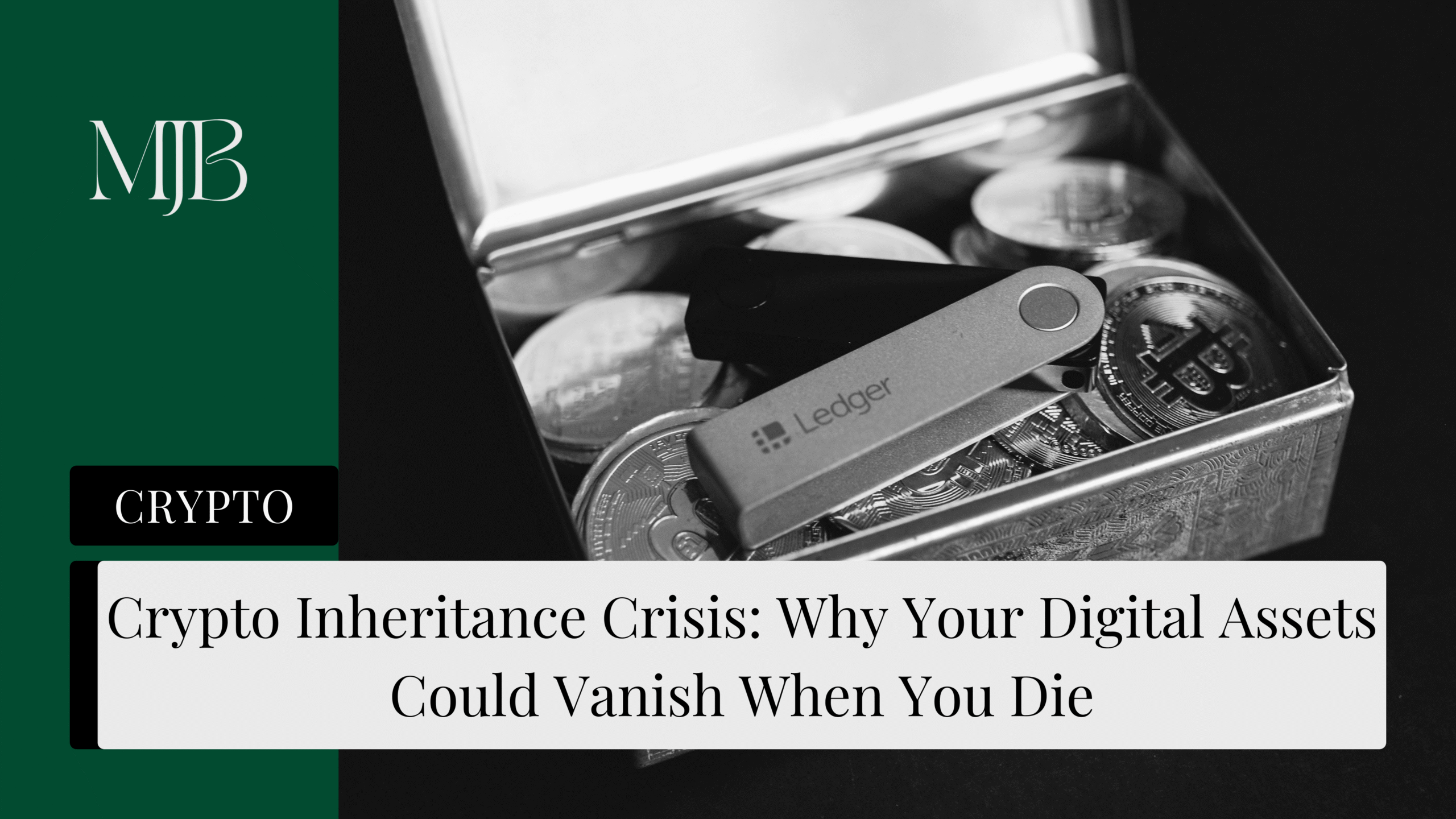Ponder on this: You’ve built a solid cryptocurrency portfolio worth thousands—maybe even millions. But here’s the shocking truth nobody’s preparing for: when you die, those digital assets could vanish into the blockchain forever, leaving your family with nothing.
With 12% of UK adults now owning cryptocurrency (that’s seven million people), we’re staring at a massive crypto inheritance crisis. Law firm TWM Solicitors warns that families could lose millions in crypto assets simply because traditional estate planning wasn’t built for the digital age.
Here’s why your crypto inheritance plan probably doesn’t exist—and what you need to do before it’s too late.
Why Crypto Assets Disappear After Death
Unlike your traditional bank account, cryptocurrency lives in a decentralised world where nobody keeps track of who owns what. When crypto investors die without proper digital estate planning, their assets become permanently inaccessible.
“The main problem is that crypto assets are decentralised and often under a pseudonym,” explains Stuart Downey, partner at TWM Solicitors. Your Bitcoin wallet doesn’t have your name on it like a bank statement.
Add the security layers that make crypto valuable—private keys, seed phrases, hardware wallet passwords—and you’ve got a perfect storm for lost inheritance. Lose these digital credentials, and the cryptocurrency is gone forever. No customer service to call, no bank manager to help.
Traditional Estate Planning Fails for Digital Assets
When someone dies, executors typically run asset searches to track down forgotten accounts and investments. It’s efficient for traditional financial assets and contacts hundreds of institutions.
But cryptocurrency inheritance? There’s no such service.
“As far as I am aware, there’s no such thing for cryptocurrency,” Downey notes. “Even if there were, it is unlikely to work for private wallets.”
This gap becomes critical when you consider that 49% of UK millennials plan to invest in digital assets. That’s an entire generation building wealth that could simply disappear without proper crypto estate planning.
Essential Steps for Crypto Inheritance Planning
The solution isn’t complicated—it’s updating your will and estate planning for digital assets. Here’s what crypto investors must do:
Document Your Digital Assets: Create a comprehensive inventory of all cryptocurrency holdings, exchange accounts, and wallet addresses. Include specific details about each platform and storage method.
Secure Access Information: Store private keys, seed phrases, and passwords safely. Consider using secure digital vaults, safety deposit boxes, or multi-signature wallets for inheritance purposes.
Choose Crypto-Savvy Executors: Select executors who understand cryptocurrency technology and inheritance procedures. Provide them with detailed instructions for accessing and managing digital assets.
Update Legal Documents: Work with solicitors experienced in digital asset inheritance to ensure your will properly addresses cryptocurrency holdings.
“Assuming digital assets will be automatically inherited after death may result in them being lost forever,” warns Downey.
Cryptocurrency Inheritance Solutions That Work
Modern crypto inheritance planning involves several proven strategies:
Crypto Inheritance Services: Some platforms now offer specialised cryptocurrency inheritance solutions that allow secure asset transfer to beneficiaries.
Multi-Signature Wallets: These require multiple parties to approve transactions, enabling secure inheritance mechanisms for digital assets.
Trusted Custodians: Consider storing significant crypto holdings with reputable custodial services that offer inheritance procedures.
Regular Updates: Crypto portfolios change frequently—update your digital estate plan whenever you acquire new assets or change storage methods.
Protecting Your Digital Wealth Legacy
Don’t let your cryptocurrency investments become tomorrow’s cautionary tale. With millions of Brits holding digital assets, proper crypto inheritance planning has never been more crucial.
The crypto revolution promised financial freedom—but only if you can actually pass it on. Update your estate planning, secure your digital credentials, and ensure your family knows about your cryptocurrency investments.
Ready to protect your digital wealth? Consult with estate planning solicitors who understand cryptocurrency inheritance before your assets become another lost fortune.
FAQ: Crypto Inheritance Planning Essentials
Q1: Can my family access my cryptocurrency without private keys?
A: No. Without private keys, seed phrases, or access credentials, cryptocurrency assets become permanently inaccessible. Traditional probate processes cannot unlock blockchain-secured digital assets, making proper crypto inheritance planning essential.
Q2: Should I include crypto details directly in my will?
A: Never put sensitive information like private keys directly in wills, as they become public documents. Instead, reference secure documents with detailed access instructions stored separately with your solicitor or in secure digital vaults.
Q3: Is cryptocurrency held on exchanges easier to inherit?
A: Exchange-held crypto is somewhat easier to access through estate procedures, but you’ll still need proper documentation and legal processes. Some exchanges now offer inheritance procedures, but most require extensive verification from executors.
Q4: How often should I update my crypto inheritance plan?
A: Review your digital estate planning whenever you acquire new cryptocurrency, change wallets, or update security measures. At minimum, conduct annual reviews to ensure all digital assets are properly documented and accessible.
Q5: What happens to my NFTs and other digital assets?
A: NFTs and other digital collectibles face similar inheritance challenges to cryptocurrency. They require proper documentation of wallet addresses, access credentials, and detailed instructions for executors to transfer ownership to beneficiaries.
DISCLAIMER
Effective Date: 15th July 2025
The information provided on this website is for informational and educational purposes only and reflects the personal opinions of the author(s). It is not intended as financial, investment, tax, or legal advice.
We are not certified financial advisers. None of the content on this website constitutes a recommendation to buy, sell, or hold any financial product, asset, or service. You should not rely on any information provided here to make financial decisions.
We strongly recommend that you:
- Conduct your own research and due diligence
- Consult with a qualified financial adviser or professional before making any investment or financial decisions
While we strive to ensure that all information is accurate and up to date, we make no guarantees about the completeness, reliability, or suitability of any content on this site.
By using this website, you acknowledge and agree that we are not responsible for any financial loss, damage, or decisions made based on the content presented.






